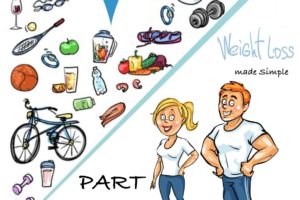
When it comes to weight loss, you might expect that every single part of your training and nutrition would have the same significance on your results, and you would, therefore, treat each aspect equally. However, the harsh truth of the matter is that up to 80% of the efforts people put into their health and fitness is producing minimal results. Everyone wants weight loss made easy. Here’s how.

Out in the health and fitness world, there is a lot of bull crap to filter through. Countless companies take advantage by selling bogus supplements, pointless exercise machines, fad diets, and placebos that all claim to get you your dream physique. Year after year, you’ve seen the “next best thing” or “magic bullet” solution that claims to solve your problems. Examples include low carb, low fat, gluten-free, sugar-free, fruit-free, juice diets, smoothies, energy bars, 24-hour fasts, paleo, Atkins, vegan, acid-alkaline balances, detoxes, hormone control. It’s endless!
People feel like they are spinning their wheels, working hard, and getting nowhere fast, and understandably, this can be very frustrating. But what if I told you that this could be made to work in your favor? By spending less time and energy on the trivial many and spending more energy on a few fundamentals, you can get more done with less effort. By prioritizing your approach to nutrition and training, you can live life more relaxed, balanced, sustainable, enjoyable, less stressed, and still get astonishing results with relatively little effort. The big question now becomes, “How do I know what is going to help me genuinely and what is a waste of time?”
“The main thing is to keep the main thing the main thing”. – Stephen Covery, author of the 7 habits of highly effective people.
When it comes to nutrition and training, you must get your priorities right, otherwise, you’re wasting time, effort, stress and money on minimal results.
Weight Loss made easy – Priorities of weight loss
Weight loss Priority 1 – Calories

For weight loss to occur, your body MUST require more energy than you are consuming. This places you into a calorie deficit (negative energy balance) that triggers body fat to be released from storage to provide that additional energy you require. If you are looking to gain weight (lean muscle gain), then the opposite applies. You should only follow one goal at any one time, as it’s inefficient and practically pointless to try and achieve both simultaneously. So how do we ensure we get into a calorie deficit? Here are your options:
- RECOMMENDED – Follow the complete “Get Fit Forever” program. Click here.
- Create a nutritional plan at your ideal calorie level, print it out, and follow the plan.
- Set calorie and macro goals in advance, then use a mobile app (such as MyFitnessPal) to track the food.
- Another option is to simply cut back on calorie-dense foods or food groups. Practice mindful eating and stop when you’re only 80% full.
If you think about it, almost every weight loss, “diet,” is trying to accomplish the same thing. Directly or indirectly, consciously or unconsciously, the goal of the diet is to get you to eat less. Many methods of achieving a calorie deficit can work, but I don’t believe every method is equally successful.
It doesn’t matter if it’s intuitive eating, estimating portion sizes, low carb, low-fat, or clean foods. Any method will fail if you don’t maintain that calorie deficit.
My personal choice is my GET FIT FOREVER program. I trust the wisdom of my body and listen to it to tell me what to eat – the types of food as well as the amounts – by simply listening to your body’s natural signals.
Whatever method you use to try losing fat, the bottom line is, if you don’t get your calorie balance right, you will not succeed, no matter what foods you eat, no matter what macros you eat, no matter how healthy you eat. Getting calories right is the top priority for weight loss.
Let’s use the calculator from George Health:
Aim to burn off 0.5 – 1.0% of bodyweight per week. Don’t make any adjustments for the first 4 weeks. Then, make adjustments in steps of 50 – 100 calories based on your weekly results.
Suggested Links:
Weight Loss Priority 2 – Protein

The root of the word protein, translated, means “of first importance.” It may not be first on my list of priorities, but it most important compared to carbs and fats. I love eating carbs, but they are not an essential nutrient. There are essential fatty acids, but you don’t need large quantities of fat either.
Protein is essential. Research continues to confirm to us how important protein is when you’re getting leaner:
- Helps to stop muscle loss when you’re in a calorie deficit.
- Has the highest thermogenic effect.
- Helps make you feel fuller or suppress your appetite.
- Has obvious muscle-building benefits.
Because of the support protein lends to your weight loss efforts, it’s the highest priority macronutrient for body composition goals. That’s why you should calculate your protein needs and be sure you have your protein covered. If you get your protein right and your calories right, you’re probably 80% of the way there toward setting up a weight loss plan that works.
How Much Protein?
If you’re weight training (and you should be), my recommendation is:
One gram per pound of body weight per day.
Suggested Links:
Weight Loss Priority 3 – Carbs and Fats

For all the attention given to high-fat diets and low carb diets, you’ll be surprised to notice how little I worry about carbs and fats.
Low carb diets, high-fat diets, both are a waste of time if you are eating too many calories. There’s no magic ratio or gram amount of either macro that makes you burn fat faster.
Once I set my protein requirements, I don’t worry about my carbs or fats as much. I go by how I feel, what gives me the best energy, and the best results for me specifically. It’s all about knowing your own body and what works for you. If you feel that you perform better each day on lower or higher carbs/fats compared to other people, then go for it because it works for you.
If you want to keep wasting time or raising your stress levels in the diet battle between low carbs, high fats, gluten-free, lactose-free, and all that trivial stuff, then go ahead. It’s a fact that thousands of people have succeeded in using all these types of diets – short term and long term. What they had in common is they achieved a calorie deficit, consumed adequate-protein, and their choice of n was based on knowing they would enjoy and sustain their plan and have no problem sticking with it long term.
Do I have ideas about what’s optimal for carb and fat intakes or recommendations for best practices? I certainly do. My clients’ carb and fat intakes are customized to a high degree based on their personal preference and on what works best for them. What I don’t like is extremes on either end of the spectrum.
Here’s the simple trick: Do your calorie math and do your protein math. Then fill in the rest of your calorie budget with protein and carbs in the amounts that make you happy. That’s it; you’re done (for now). Want to experiment and fine-tune the macronutrient amounts? Great! You should. But not until you know priority #1 and #2 above are covered.
Suggested Links:
Weight Loss Priority 4 – Nutrient quality – Liquids, vitamins, minerals, fibre, and the rest

I always say to get about 90% of your calories from healthy natural, nutritious foods that you enjoy and to drink plenty of water throughout the day. That’s my simple advice. I find wholesome natural foods such as lean meats and fibrous fruits and vegetables much more filling, more satisfying, and more energy stable compared to heavily processed foods. I shop for foods that fill me up, satisfy me, taste great, and keep my body healthy and optimal. It makes priority 1 (calories) much more comfortable to achieve!
Some of you will enjoy healthy foods 95%+ of the time, take pride in eating nutrient-rich meals, and prefer to stay clear of fast food, sugar, desserts, and other treats, and that’s fine. Others enjoy being more relaxed while still tracking calories and macros carefully and eating healthy 80% of the time. In either case, the rule is always clear and simple: eat healthy foods you enjoy the vast majority of the time.
“Healthy foods that you enjoy” is essential. One of the biggest reasons most diets fail is because they are prescribed foods to eat every day that they don’t like (and forbidden from foods they do like). You’re not going to stick with any nutritional lifestyle long-term by eating someone else’s way – even if it’s scientifically sound or it worked well for them. The more rigid the lists of allowed and banned foods, the less likely you are to stay with it.
Many people want the work “done-for-them,” and they want rules painted in black and white. These facts are taken advantage of by marketing experts; as they “sell you a fish” instead of what I do, “teaching you how to fish.”
When I put micronutrition below calories and macronutrients, I’m not suggesting you should eat anything you want as long as it fits your calories and macros. As I said before, even sincere and honest fitness professionals have jumped the shark with this “fit your macros” mantra. I’m saying, start with calories and macros, but don’t stop there.
Health and fat loss overlap, but they are two separate subjects, and people continuously forget this. You can eat healthy foods and gain fat if you eat too many of them. You can eat unhealthy foods and still achieve weight loss if your calories are low enough. That’s why calories are at the top of my list. However, weight loss should be a healthy endeavor, and enjoying good health, energy, and vitality requires attention to the quality of food you eat and probably more so as you get older.
Once you’ve got you goal numbers set for daily calories, protein, carbs and fat, fill them in with (approximately) 90% healthy, satisfying, wholesome foods that you choose yourself, that you enjoy and then you too can be both lean, healthy and happy – for life!
Fibre Requirements
Minimum: 10g of fiber for every 1000 calories you eat. (e.g., if your calorie target were 1600 calories per day, then min fiber would be 16g)
Maximum: 20% of your carb intake. (e.g. if carbs per day were 200g, then max fiber would be 40g)
Weight Loss Priority 5 – Nutritional Timing

Nutrient timing is highly overrated. Many put meal timing, post-workout meals at or near the top of their priority lists. Entire programs have been created, and books are written based on nutrient timing, often claiming that optimizing nutritional intake is the most important thing you could to improve body composition. Examples of these include:
- Post-workout nutrition, including taking pre, intra, or post-workout supplements. Many supplement companies promote the famous post-workout “window of opportunity” where you are supposed to eat immediately after training or risk wasting all your hard work. Current science suggests that while nutrition after intense training is vital for recovery and progress, it’s not the most critical factor, especially when weight loss is the goal. Current research also suggests that the best way to look at nutrient timing is to consider the entire several-hour period from the meal before your workout, the workout itself, and the period after the workout. It also suggests that the post-workout “window” lasts longer than most people used to believe, mainly if you ate before training.
- Meal scheduling. Some people swear that breakfast is the most important meal of the day, and others say you should skip breakfast and eat most of your calories at night (intermittent fasting). Some dieters believe carbs are okay, but they should only be consumed in the morning, and others say carbs should be eaten at night and be avoided in the morning. Guess what? These types of “nutrient timing” fads are either complete nonsense, or some level is valid, but it’s minutia compared the higher priorities.
- Meal frequency. So is 5-6 meals a day optimal? Or is it three meals plus snacks? Or doesn’t it matter at all?
Who is right? Even though nutrient timing matters, it’s on the bottom of my priority list. If you eat too many calories, it doesn’t’ matter how many meals you had; you’re going to gain fat. If you eat too infrequently and the long gaps in between make you ravenously hungry and you binge and overcompensate with excess calories later – you get fat. And, if you eat too many calories, it doesn’t matter how perfect your pre-, peri-, and post-workout nutrition is, you’re getting fat.
There’s no single best way to schedule your daily meal plan. It’s highly unique and personal as a choice for each individual. Your daily meal plan should be based on your goals, your personal preferences, and your willingness and ability to follow for the long term.
Your meal schedule should be customized and it should be your choice, it should not be dictated by rigid program guidelines from any guru or diet book. Make the decision for yourself, or choose coaches who teach a structured, yet flexible approach, and don’t be afraid to experiment a little.
One thing I encourage everyone to do is daily meal planning. Motivational speaker Jim Rohn once,
“Don’t start your day until you’ve finished it.”
What he meant was, don’t wing it. Go into your day, knowing what you’ll eat and when you will eat it because you have a daily meal plan on paper. Research does not say there’s one ideal meal frequency. But the studies mean that an inconsistent or haphazard meal pattern is inferior to a scheduled and consistent one – for both health and weight loss. Also, having a regular meal plan schedule taps into the power of habit, and the longer you do something, the easier it gets to do.
Bottom line: Nutrient timing does belong on the priority list, but getting your calories, macros, and healthy food choices in order are all higher in importance.
Weight loss made easy – What about supplements?
Some people could argue that the evidence-based use of supplements should be on the list, though granted, most of those people are selling them. Nearly everyone agrees supplements are the item of lowest importance. I’ve chosen to leave them out entirely because I consider my list a hierarchy of priorities, and I don’t see supplements as a priority at all – especially when we are talking about weight loss.
Out of all the supplements on the market, the so-called fat burners have the worst track record, the most scams, and the fewest evidence-based products than any other supplement category. Generally speaking, “fat burner supplements” either don’t work, or the benefit is so small it’s not even worth mentioning. On rare occasions, products have emerged that did work, but there were side effects or safety questions.
For competitive bodybuilders or athletes where the slightest edge makes a difference, certain types of supplements might help with workout performance, recovery ,and so on. You also have protein powders which could help you hit your (very important) protein goal. But supplements are simply not a priority for the average health and fitness enthusiast in the overall scheme of things. Supplements are known in the tradition of the Pareto Principle as one the “trivial many.” I find a big crispy chicken salad or a hearty omelet is much more satisfying than a protein shake anyway. Use protein shakes sparingly as your travel buddy or emergency ration when you have nothing else available at the time. Real food is better.
Weight loss made easy – suggested links:






Leave a Reply